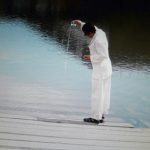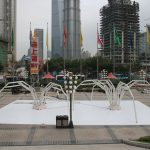Meet a NYFA Artist: Roxane Butterfly
NYFA speaks with 2002 and 2008 Choreography Fellow and Fiscally Sponsored Choreographer, Roxane Butterfly.
NYFA: Hi Roxane, can you tell us what are you working on and/or what’s coming up for you?
RB: I finished the manuscript of a book I wrote during my pregnancy and I am looking for an editor.
I recently completed a contemporary-tap piece called AD-LIB with multi-media artist Xumo Nounjio from Cameroun which is inspired by the work of Spanish poet Federico Garcia Lorca. It premiered at the Mediatheque de Narbonne in France and was presented at the Centro Civico de Barceloneta (in Barcelona, last week). I am looking forward to taking this piece on the road.
I am on my way to Morocco to work with African refugees at the Foundation Orient-Occident, and present the result of this work at the Rabat-Africa Festival late June.
I have been working on a collaboration with pianist Frederique Trunk, featuring my poetry alongside with my dance, and it will be presented at Joe’s Pub on July 31st 2010 (*if all goes according to plan)
Since my receiving a Guggenheim Fellowship, I keep on investigating tap’s relationship to flamenco and started a project with the famous Tomasito to be presented in Budapest in August.
NYFA: How do you begin writing a piece?
RB: It is never the same. It could be an inspiration because of a book I read, someone I meet, a melody that comes to my ear, something I see on the news… But the common thread in all I do comes from my questioning my sense of belonging. Why does this moves me? How do I relate to this or that which calls my attention? Where do i fit in as a woman? I do like to spend hours in the studio, listening to music and letting my body find its way thru space without necessarily trying to choreograph, rather embody the moment, trusting that my getting close to the music will leave its mark into my body memory. When I work on a specific idea, whether it is my own challenge to myself (like blending tap with flamenco), or an “order” from a presenting entity (such as my recent work on Andalusian poet Federico Garcia Lorca), I absorb myself into the world I am reaching out to (like practicing to flamenco compas and taking flamenco classes or reading Lorca’s own analysis of poetry). Then I think pf “sounds” to translate this world. The body follows.
NYFA: What kinds of resources are you most in need of right now as an artist?
RB: I would need some type of emergency funds for women-artists/ self-employed/self-managed/single-mothers to make up for the months work stopped coming in for being pregnant and then dealing with the aftermath of a C-section … Plus, as in my personal case, I happen to be the mother of a down syndrom child, much of my day is involved with the extra-caring this condition requests. So I basically have no time to either practice or network myself, create room in my head to think art, even though I kept myself physically involved with the dance throughout my pregnancy and my post-cesarian healing period.
I would also need a free space to keep practicing in order to stay in shape for when the work kicks in again.
I would need qualified managing assistance to help keep my work visible.
NYFA: Who/what is your biggest influence or inspiration right now?
RB: My child and all the students I have trained in Europe and who start making things happen back “home”. They give me the sense that all wasn’t in vain.
NYFA: What is an indulgence for you?
RB: To just think of what an indulgence could be indeed!
NYFA: What project or idea is on the edge of your horizon right now?
RB: Most importantly, I am beginning a relationship with an arts space in Barcelona to build a tap-home/ Jimmy Slyde Institute in Europe, so that there could be a place for people to come to on and off to study, perform, share information, where I could come to pass on the knowledge I received from my beloved hoofing masters, as well as investigate new creative paths for tap, aside from the mainstream if needs be.
NYFA: What is your relationship to nature?
RB: I can’t live without it.
I was very impressed once by hearing a little girl say: “When I grow up, I want to be a leaf on a tree.” This is one of the most profound statement I heard a human pronounce. I wrote a piece inspired by these words. I find living in New York extremely challenging because I grew up between the sea and the country side. I am very attached to my country house in a small village outside Toulon. The smell of the earth at dawn, the sight of birds during the fall who draw mesmerizing choreographies in the sky as they set on their trip to warmer places, the brightness in the sky after a summer rain-storm, the scent of wild flowers around Easter time… always bring deep feeling of nostalgia to me. May be this is how one defines their identity. Through their perception of Nature’s manifestation in their daily life.
NYFA: Where did you grow up and how did it affect your work?
RB: I grew up in a Mediterranean port, the city of Toulon, Southern France. Even though I left twenty years ago and find it hard to identify as French, _ especially as an artist who constructed her identity in an African-American environment (:the New York tap scene of the nineties), I know that my upbringing makes me different to some degree. Throughout my entire career I heard the same comment : “you really don’t dance like an American…”. And yet, anything I learned about the dance, tap, I learned in the US. But I guess, I must tap with a French accent! It it is also true that when I felt the need to document my story with tap, I wrote a book in French… I also know that in dance, Europeans tend to be more conceptual whereas Americans may be more focused on the technical aspect of their performance. So there are works I do in Europe that don’t get shown in the US and vice-versa. While I am the same artist, i feel like there are two Roxane Butterfly… I relate to the way European work, but my work method is definitely the one of a New Yorker , which sometimes creates cultural-shocks.
NYFA: How do you balance your work and your life?
RB: I take care of my child during the day, while figuring out some time and money to rent space to practice every other day, and I attempt to take care of business at night, rarely before midnight!. My art and my life are the same entity. Work for me is the business side of making the art exist. When I can, I take breaks from going out over several days and I just isolate myself to write continuously or edit my videos around the clock. Most of my inspiration comes from my travels and the people I meet, especially children.
NYFA: How has The NYFA Fellowship impacted you?
RB: I would not have gone anywhere without its support. NYFA was my first break into the not-for-profit world, which at first seemed so inaccessible. Everything came from the credibility NYFA gave me, up to my receiving a Guggenheim Fellowship.
For more information on Roxane Butterfly, visit her website.





